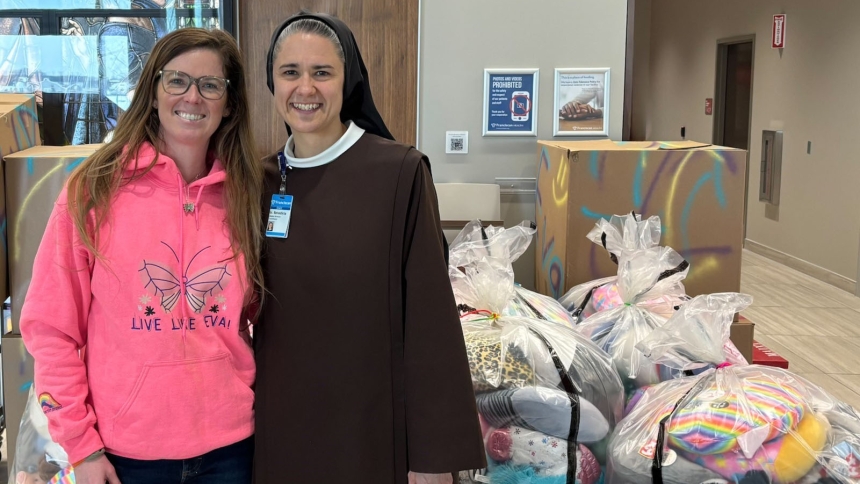
Nota: para la traducción en español, ver abajo
In this edition of the newspaper, you will find the Indiana Bishops’ Pastoral Letter on Poverty which was issued this Lent. The state bishops rightfully reflect on our religious obligation to serve the poor and suffering while simultaneously working for structural and lasting change in our society to ensure a greater justice for all people. Our Catholic faith has never been a private affair between Jesus and us; the Gospel has always had social implications. From the very beginning, the Church held possessions in common, helped the poor and cared for the sick.
The pastoral letter touches on four major themes: family life, employment, education and health care. We know the best way to help people out of poverty is to help them get a good education and a secure job. In our beloved state of Indiana, many children are falling through the cracks, not able to succeed in life because they do not finish school and cannot find sustaining work. Government, private business, churches, community organization and individuals valiantly try to help in many ways, but most of us can do more to help our children, young people and the unemployed to find their rightful place in our society.
The Church has always been passionate about the family because we see it as the organic cell of both the Church and society. Children who grow up in loving and secure homes with their biological mother and father have a far greater chance of succeeding in life. We must do all we can to prepare engaged couples for the blessings and demands of marriage as well as help married couples and families to flourish. We also have a special place in our hearts for those who are separated, divorced or single parents. So many of our children grow up in chaotic, loveless and confusing environments, surrounded by violence, poverty, drug abuse and lack of religious faith. How can we turn this disturbing trend around?
Access to good and affordable health care is a basic human right. While the U.S. Catholic bishops have criticized the aspects of the Affordable Health Care Act that impinge on religious freedom, they have advocated for better access to health care for the poor for decades. We may legitimately differ over the best way to provide health care to everyone but we would certainly all agree that everyone should be able to access a good doctor, needed medicine and the services of a reliable hospital. It is no coincidence that the poor suffer higher rates of mortality and illness.
The Catholic Church in this country is the largest private provider of education and health care; we are committed to the flourishing of marriage and family life; we have articulated well the duties and rights of workers. As disciples of Christ, we care about what happens to people, not only in the next life, but also right here and now in this world. Jesus came that we might have life and have it abundantly. This life is spiritual, relational, intellectual, emotional, economic, cultural and political. We can never live a spirituality that does not transform both us and the world around us in all of its dimensions.
In his exhortation, “The Joy of the Gospel,” Pope Francis calls all of us to personally engage with the poor, to translate the Gospel into concrete social action that exudes both charity and justice. I commend and am grateful for the thousands of institutions and individuals who heroically and sacrificially serve the poor and the sick here in the Diocese of Gary. All of you are a blessing and an inspiration. I encourage all of us, including myself, to be even more committed to the social dimension of our faith, to be people of both charity and justice, to share more of our wealth, time and love with those who so desperately need it.
Living at the cathedral in Gary, I witness every day the economic and social devastation of our beloved city. Every morning, I do my prayer time by my front window, looking out over the neighborhood and city. I ask the Lord to bless our communities, the city and our diocese and then I ask for two gifts: that I may never become complacent or blind to the suffering that is all around me and that together we can do more to transform the lives of those who live in poverty and despair. I hope I will live at the cathedral long enough to see restored homes, streets filled with playing children and economic opportunities for the poor and destitute. Please read the bishops’ letter and continue to act, serve, love and sacrifice for God’s poor.
For the full text of the Indiana Bishops’ pastoral letter, Poverty at the Crossroads: The Church’s Response to Poverty in Indiana, see pages 9-14. The text is also available in Spanish at dcgary.org.
+ Donald J. Hying
Carta sobre la pobreza se centra en la familia, trabajo, educación, cuidado de la salud
En esta edición del periódico, ustedes encontrarán la Carta Pastoral de los Obispos de Indiana sobre la Pobreza que se emitió esta Cuaresma. Los obispos del estado legítimamente reflexionamos sobre nuestra obligación religiosa para servir a los pobres y el sufrimiento mientras simultáneamente trabajando para los cambios estructurales y duraderas en nuestra sociedad para asegurar a una mayor justicia para todas las personas. Nuestra fe católica nunca ha sido un asunto privado entre Jesús y nosotros; el Evangelio siempre ha tenido implicaciones sociales. Desde el principio, la iglesia tenía posesiones en común, ayudaba a los pobres y cuidaba de los enfermos.
La carta pastoral toca en cuatro temas principales: vida familiar, empleo, educación y salud. Sabemos que la mejor manera de ayudar a la gente de la pobreza es para ayudarles a obtener una buena educación y un trabajo seguro. En nuestro amado estado de Indiana, muchos niños están cayendo en el olvido, no pueden triunfar en la vida porque no completan la escuela y no pueden encontrar trabajo autosostenible. Gobierno, empresas privadas, iglesias, organizaciones comunitarias e individuos valientemente intentarán ayudar de muchas maneras, pero la mayoría de nosotros podemos hacer más para ayudar a nuestros niños, jóvenes y los desempleados a encontrar el lugar que les corresponde en nuestra sociedad.
La iglesia siempre ha sido apasionada sobre la familia porque lo vemos como la célula orgánica de la iglesia y la sociedad. Los niños que crecen en hogares amorosos y seguros con su madre biológica y el padre tienen mayores posibilidades de éxito en la vida. Debemos hacer todo que lo posible para preparar parejas comprometidas por las bendiciones y las demandas del matrimonio, así como ayudamos a matrimonios y familias para prosperar. También tenemos un lugar especial en nuestros corazones para aquellos que son padres separados, divorciados o individuales. Muchos de nuestros niños crecen en ambientes caóticos, sin amor y confusos, rodeado de violencia, pobreza, abuso de drogas y falta de fe religiosa. ¿Cómo podemos poner esta preocupante tendencia?
Acceso a la salud buena y asequible es un derecho humano básico. Mientras que los obispos católicos de los Estados Unidos han criticado los aspectos de la Ley de Cuidado de Salud Asequible (Affordable Health Care Act) que inciden sobre la libertad religiosa, que han impulsado para un mejor acceso a servicios de salud para los pobres durante décadas. Podemos legítimamente discrepamos sobre la mejor manera de proporcionar atención sanitaria a todo el mundo pero sin duda todos coincidiríamos que todos deben poder acceder a un buen médico, la medicina necesaria y los servicios de un hospital confiable. No es casualidad que los pobres sufren mayores tasas de mortalidad y enfermedad.
La iglesia católica en este país es el mayor proveedor privado de la educación y la salud; estamos comprometidos con el florecimiento del matrimonio y la vida familiar; hemos articulado bien los deberes y derechos de los trabajadores. Como discípulos de Cristo, nos preocupamos por lo que sucede a la gente, no sólo en la próxima vida, sino aquí y ahora en este mundo. Jesús vino que podamos tener vida y tenerla abundantemente. Esta vida es espiritual, relacional, intelectual, emocional, económica, cultural y política. Nunca podremos vivir una espiritualidad que no transforme tanto nosotros como el mundo que nos rodea en todas sus dimensiones.
En su exhortación, "La Alegría del Evangelio," Papa Francisco llama a todos a comprometerse personalmente con los pobres, para traducir el Evangelio en acción social concreta que emana de la caridad y la justicia. Elogio y estoy agradecido por las miles de instituciones e individuos que heroicamente y sacrificadamente sirven a los pobres y los enfermos aquí en la Diócesis de Gary. Todos ustedes son una bendición y una inspiración. Animo a todos nosotros, incluido yo, para ser aún más comprometido con la dimensión social de nuestra fe, ser gente de caridad y justicia, para compartir más de nuestra riqueza, tiempo y amor con aquellos que lo necesitan desesperadamente.
Viviendo en la Catedral de Gary, yo presencié cada día la devastación económica y social de nuestra amada ciudad. Todas las mañanas, hago mi tiempo de orar por mi ventana, sobre el barrio y la ciudad. Le pido al Señor que bendiga a nuestras comunidades, la ciudad y nuestra diócesis y luego pedí dos regalos: que yo nunca podría ser complaciente o ciego a los sufrimientos que es todo lo que me rodea y que juntos podemos hacer más para transformar las vidas de aquellos que viven en la pobreza y la desesperación. Espero que yo viviré en la Catedral de tiempo suficiente para ver casas restauradas, calles llenas de los niños jugando y las oportunidades económicas para los pobres y los indigentes. Por favor lean la carta de los obispos y continuen a actuar, servir, amor y sacrificarse para los pobres de Dios.
Para el texto completo de la carta pastoral de los obispos de Indiana, La Pobreza en la Encrucijada: Respuesta de la Iglesia a la Pobreza en Indiana, favor de ver páginas 9-14. El texto también está disponible en español en dcgary.org.
+ Donald J. Hying



